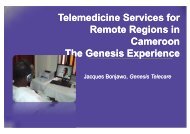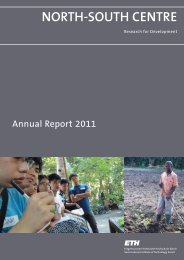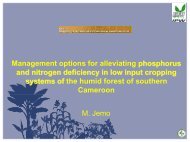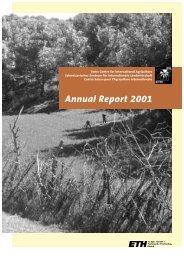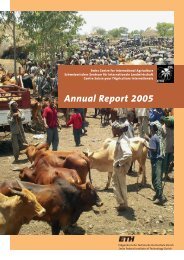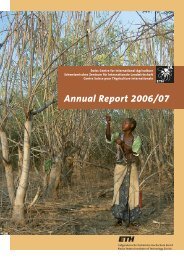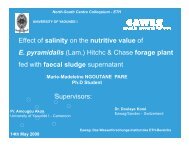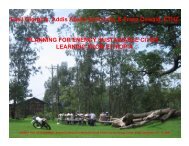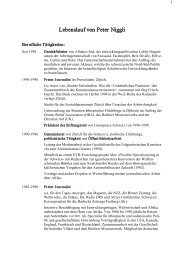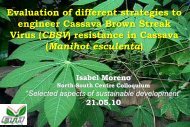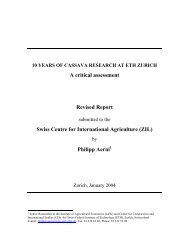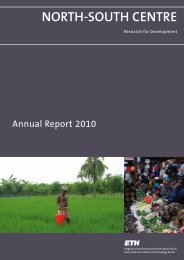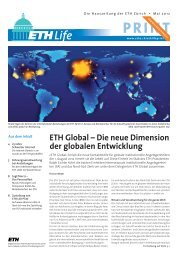NORTH-SOUTH CENTRE - ETH - North-South Centre North-South ...
NORTH-SOUTH CENTRE - ETH - North-South Centre North-South ...
NORTH-SOUTH CENTRE - ETH - North-South Centre North-South ...
Create successful ePaper yourself
Turn your PDF publications into a flip-book with our unique Google optimized e-Paper software.
Understanding the views of poor<br />
households in rural municipalities<br />
In Honduras, about half of the population live and work<br />
in rural areas dominated by steep hills and mountains. In<br />
these areas smallholder farming predominates, mostly on<br />
subsistence levels. Access to services and economic opportunities<br />
other than agriculture is low, and the poverty rate<br />
is very high at 77%. In 2001, Honduras introduced an ambitious<br />
poverty reduction strategy (PRS) in order to fight<br />
poverty and to receive debt relief. The strategy includes<br />
measures such as a general increase in social expenditure,<br />
the set-up of a decentralised poverty reduction fund for<br />
local projects, or programmes such as access to agricultural<br />
land or reactivation of the rural economy. However, neither<br />
in rural nor in urban areas did the poverty rates decrease<br />
significantly between 2001 and 2008.<br />
This project aims at analysing the PRS, its implementation<br />
and its benefits for poor and marginalised households<br />
in view of future development strategies. I am comparing<br />
the livelihood situation of rural poor with the PRS process<br />
in two municipalities. In late 2008 and beginning of 2009,<br />
I selected two municipalities in Western Honduras. First, a<br />
landscape and history mapping of each municipality was<br />
carried out and complemented with a brief, random sample<br />
household survey in each location. Based on these findings,<br />
I will select the sample for the life history interviews.<br />
In June and July 2009, qualitative interviews with local politicians<br />
and members of community development councils<br />
were conducted. These interviews focused on the development<br />
processes and especially the implementation of<br />
PRS- related policies at the local level. The preliminary results<br />
indicate differences between the two study locations<br />
with regard to the political space that is open to poor and<br />
marginalised households for influencing PRS project formulation<br />
and implementation. While in one municipality<br />
PRS projects are prioritised in a participatory process, in the<br />
other study location the local political elite decides on how<br />
these funds are spent. However, at this stage no conclusion<br />
can be drawn on whether poor households can effectively<br />
integrate their needs into the PRS process in either one<br />
of the municipalities. I cannot yet say whether they feel<br />
represented by the elite and finally, whether the PRS projects<br />
satisfy their needs. These questions will be tackled during<br />
the next field stay. I will then explore the livelihood situation<br />
and strategies of the local poor, as well as their views on<br />
the PRS process and results at the local level using qualitative<br />
life history interviews.<br />
74<br />
Research fellow<br />
Sandra Contzen,<br />
University of Zurich and SHL, Switzerland<br />
Supervisors<br />
Ulrike Müller-Böker and Urs Geiser,<br />
University of Zurich, Switzerland;<br />
Urs Scheidegger, SHL, Switzerland<br />
Capacity development<br />
Research fellowships<br />
Collaborators<br />
Maria Eugenia Baltodano, CIAT, Nicaragua;<br />
Arie Sanders, University Zamorano, Honduras;<br />
Andrea Flück and Rudi von Planta, SDC, Honduras<br />
Duration<br />
June 2008 – May 2011<br />
Group discussion with members of a community<br />
development council, Coalaca, Honduras



